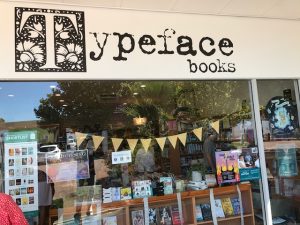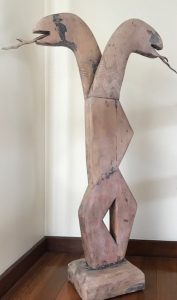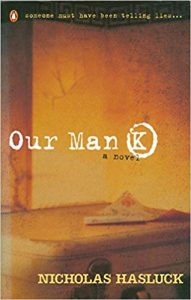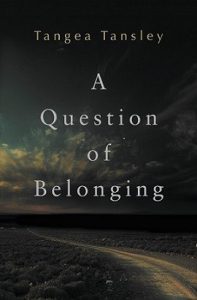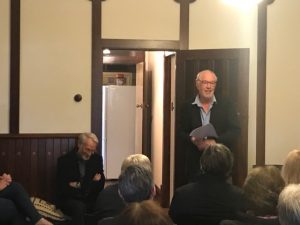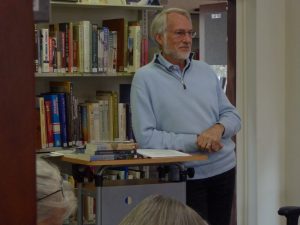The long arms of Shakespeare’s ghost reach across the centuries into the present day, leaving distinctive fingerprints on a genre that did not even exist in his period but has become dominant in ours: the novel.
Some modern writers rearrange situations and relationships from a Shakespearean play so that we see them through the eyes of a particular character or set of characters. Of course a dramatist can do this; in Tom Stoppard’s Rosencrantz & Guildenstern are Dead a pair of minor characters from Hamlet takes centre stage. But I’m thinking especially of prose fiction, which lends itself well to this method of reshaping Shakespeare’s material because (in contrast to a theatrical presentation, which is performed through dialogue and action and spectacle) a story can be narrated from a certain point of view or from shifting points of view.
Two examples, both of them American novels derived from King Lear: Jane Smiley’s A Thousand Acres (1991) is a grim mid-West prairie tale told from the perspective of the eldest of three daughters whose monstrously abusive ageing father leaves them his farm, while Christopher Moore’s extravagantly comic novel Fool (2009) re-imagines King Lear from the perspective of the court jester, who schemes to save Cordelia from being married off. Shakespeare’s pivotal character, the tragic patriarchal figure that gives the play its title, is no longer the main focus in either of those novels. Instead, the story revolves around what were originally secondary characters. Accompanying that fundamental shift in perspective there are also changes of tone, of psychological interest, and of moral attitudes.
A different kind of influence occurs when the main thing a modern fiction writer draws from a Shakespearean source is a central theme with perennial relevance. In such cases the extent to which plot or characters are modified can vary a great deal. I’m thinking here of a couple of novelistic appropriations of the most spectacularly theatrical of Shakespeare’s plays.
Marina Warner’s Indigo (1991) boldly reshapes most of the characters and story elements of The Tempest. It is set (like Shakespeare’s original) in the 17th-century, but some of it also takes place much nearer our own time. When Shakespeare wrote The Tempest England was establishing itself as a colonial power, and we can see his play as dramatising issues arising from colonisation. Prospero, having come to Sycorax’s island and subdued her, imposes his own culture on its inhabitants. Warner’s Indigo expands the character of Sycorax, Caliban’s witch mother, who in Shakespeare’s play remains offstage. By also extending the story into the 20th century, the novelist can portray the consequences of colonialism.
Margaret Atwood’s Hag-Seed retells The Tempest in an even freer manner while preserving thematic parallels with the original source. The main character is Felix, a theatre director in present-day Canada. After being dismissed from his arts festival role he gets a teaching position in a prison, where over several years he regularly persuades inmates to become actors in productions of Shakespeare’s plays. By participating under his direction in the dramatised violence of Julius Caesar, Richard III and Macbeth, the prisoners are able to reflect on their own past crimes and come to terms with their incarceration. Felix himself is playing a long game: his scheme is eventually to use the prison’s Shakespeare program to inflict vengeance on his old enemies, especially on Tony, a former colleague whose treachery had led to Felix’s loss of the festival job, which Tony took over. The play through which Felix ingeniously pursues his revenge is The Tempest — where Prospero is himself creating theatrical illusions to bring retribution upon those who stole his kingdom. So Shakespeare’s original plot and Atwood’s reworking of it both focus on a protagonist who tries to control the actions of those around him. And both Shakespeare’s Prospero and Atwood’s Felix can be seen as representatives of the author manipulating his or her creative work.
Atwood’s novel belongs to a series of Shakespearean retellings commissioned by the Hogarth Press for publication in 2016 to mark the 400th anniversary of Shakespeare’s death. Other contributors to this series of loose adaptations include Howard Jacobson, who turned The Merchant of Venice into Shylock Is My Name. Jacobson’s novel has such a complicated plot, such a crowded cast of characters, and so many digressive passages of dialogue that it’s not easy to follow who’s who and what’s going on. At the centre of the story are not only a contemporary British version of Shylock, a wealthy art collector named Simon Strulovitch, but also the original Shylock, who travels through time into the present and with whom Strulovitch has intense conversations about Jewishness and other topics.

Despite their various differences, the examples mentioned so far all adapt a story drawn from one of Shakespeare’s plays. But the long arms of Shakespeare’s ghost sometimes stretch beyond that kind of transposition. Modern fiction may give us an independently invented narrative line, with original characters that have no direct Shakespearean source, and yet make reference to the Bard’s writings (his plays and/or his lyric poetry) in ways that give depth and resonance to the tale. My own latest novel belongs (or at least aspires to belong) to this category. Here is Paul Genoni’s comment:
A good place to start in discussing A Thousand Tongues is with the novel’s two epigraphs, the first of which is derived from a soliloquy delivered by the King in Shakespeare’s Richard III : ‘My conscience hath a thousand several tongues /And every tongue brings in a several tale…’ It is accompanied by an epigraph from Julian Barnes’s The Noise of Time, a novel that deals with composer Dimitri Shostakovich’s struggles with his conscience in Stalinist Russia. In the epigraphic quote, Barnes suggests that conscience ‘no longer has an evolutionary function, and so has been bred out’, and that ‘within the modern tyrant’s skin … there is no cave of conscience to be found’.
These two epigraphs declare that A Thousand Tongues is a novel about conscience, the multitudinous and complex ways in which it can be manifested, the ‘slings and arrows’ it sends our way, and the role it might have in the contemporary world. The Shakespeare quote obviously provides the novel with its title, and also carries further weight within the text, where it recurs several times and performs as something of a leitmotif in the life of Gavin Staines. In this novel of many characters, both historical and contemporary, it is Staines who remains the gravitational centre around whom other characters, and their stories, circle.
Paul Genoni’s remarks (excerpted from a longer review) provide a framework for considering my novel’s relationship to certain Shakespearean texts and themes.
I’ve explained elsewhere how the initial creative impulse came from my encounter with a particular place, Dartmoor’s Prison Museum, and the meditations to which that gave rise. As the reflective process developed, I saw opportunities for incorporating several links to Shakespeare’s writings into my story in a thematically relevant way.
The idea of imprisonment often recurs in Shakespeare’s plays and poems. Think of Hamlet’s line “Denmark’s a prison”; or of Richard III, locking up the young princes in the tower; or of Richard II, jailed by his successor, Henry IV; or of the many characters in The Tempest for whom the island is a kind of jail; or of the sonnet that exclaims “Prison my heart…” and then develops this image in detail.
Two of my novel’s main characters are incarcerated in Dartmoor’s prison. One of them is Gavin Staines, mentioned above as a “gravitational centre” of the story. I’ve placed him among the conscientious objectors — more than 1000 — who were held there during World War I. Staines is uncompromising in his stance against military service but secretly burdened by a previous failure of conscience. I imagined a role for him before the war as a young teacher of literature at Queen’s College in London. Queen’s College was a notable independent school for teenage girls, some of whom were socially self-confident, intellectually precocious and emotionally adventurous. We know this from letters and diaries of some who were students there in the Edwardian era, most notably the writer Katherine Mansfield. A feature of the education offered at Queen’s was its provision of lectures courses by visiting academics. What might this environment have been like for a young man teaching poetry there? That question exemplifies how a story can emerge: the creative process is stimulated when a writer poses “What ifs”… For instance, what if a certain sonnet by Shakespeare became troublesome for a young teacher and one of his female students?
Love is too young to know what conscience is;
Yet who knows not conscience is born of love?
When the war comes and conscription is brought in, Staines registers as a conscientious objector and is eventually sent to Dartmoor. Many of the Dartmoor “conchies” were well-educated men (journalists, teachers, artists…) and they proved resourceful in entertaining themselves during the long cold evenings. Archival records show that they often put on concerts, with items such as verse recitations and stage performances — including Shakespearean plays. One of the conchie characters I invented is Humphrey Latimer, a flamboyant chap with a background as an actor and a passion for the rich language of Elizabethan drama. During one of the concerts, he delivers Hamlet’s most famous soliloquy, “To be…” etc.
Glancing around as Latimer gave his rendition of that vacillating speech, Staines could see it was causing some disquiet. These men had resolved to suffer slings and arrows rather than take up arms; but to many of them the sea of troubles must still seem endless. Some perhaps remained privately unsure whether their refusal to fight had come from courage or something less. ‘Thus conscience doth make cowards of us all’ – uneasy, tense, they shifted in their seats when they heard those bitter words.
Curious about Staines and intuiting that his aloof manner hides some secret, Latimer keeps probing. As they belong to the same work gang, Latimer has frequent opportunities to try squeezing information out of him, especially after discovering how Staines was employed before the war. Latimer uses their shared interest in Shakespeare as a means of indirect enquiry into what makes this oddly reserved man tick.
Because Staines is not only (by conviction) a conscientious objector but also (by vocation) a teacher of literature, it seemed to me plausible that he would contribute an essay to a pacifist magazine under the title “War and Peace: Shakespearean Voices.” In this invented article, Staines remarks that some British militarists had tried to conscript the nation’s supreme poet-dramatist as a patron in their zealous pursuit of bloody conflict on foreign soil, with Henry V as their exemplary text. Staines argues that, on the contrary, a wide range of Shakespeare’s characters, through their dialogue on aspects of war and peace, evoke the torments of conscience and “express eloquently what anyone sickened by the violence of warfare has felt.”
The other character in A Thousand Tongues who spends time in Dartmoor’s jail is a black man from an earlier generation, Joshua Dunn. Consigned to the margins of Victorian society because of his race and class, Dunn is treated with such cruelty during his years of imprisonment that he comes to the despairing conclusion that people like himself can’t afford the luxury of a conscience:
“Don’t give me a bloody sermon about scruples!’ Josh roared. “The likes of us can’t afford to have any. This place turns us into beasts. Every mongrel for himself, and the devil take the hindmost.”
Yet this repudiation of scruples is not absolute, as the reader discovers when Dunn’s story later connects with Staines’s in an indirect and ironical way.
And Shakespeare? At the very end, Staines has with him a copy of the Bard’s Complete Works, finding a bizarre purpose for it. So Shakespearean words bookend this novel, from its title and first epigraph to its final scene.
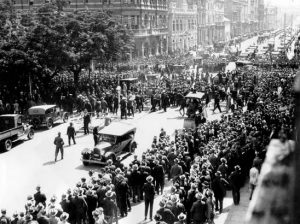
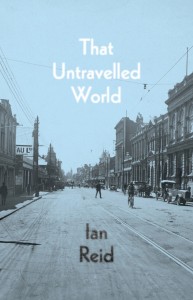 In our own time, several writers of historical fiction have gone back to that period — and I’m one of them. My novel That Untravelled World is set in Western Australia in the years 1912-39, much of it focusing on the Depression years.
In our own time, several writers of historical fiction have gone back to that period — and I’m one of them. My novel That Untravelled World is set in Western Australia in the years 1912-39, much of it focusing on the Depression years.